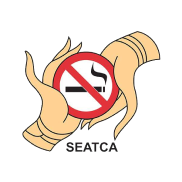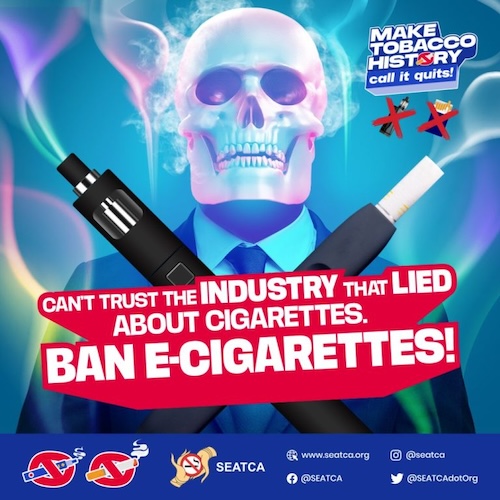
US e-cigarette company interfered with Philippine policy on Electronic Smoking Devices

16 August 2024,
By SEATCA
Bangkok: Internal documents of American e-cigarette company, Juul Labs, reveal that it actively lobbied against strict regulation of e-cigarettes by the Food and Drug Administration (FDA) while planning its product launch in the Philippines during the period when the Vape Bill was being opposed by the Department of Health, Department of Education, Philippine Medical Association and various other medical and public health organizations.

The tobacco industry has a long history of interfering in policymaking, and governments must remain vigilant to protect their bureaucracies from such influence.
Based on its review of 4,480 documents, the Southeast Asia Tobacco Control Alliance (SEATCA) reported today that Juul’s entry into the Philippines was meticulously planned, orchestrating regulator engagement, stakeholder partnerships, and media influence that deceived policy makers and the public into thinking that its product was less harmful than cigarettes. The documents pertaining to the Philippines are part of over 4 million internal documents that are being made public as part of Juul’s settlement of a US government lawsuit against it.
Juul launched its e-cigarettes in the Philippines in June 2019 through a partnership with a subsidiary of local conglomerate, JG Summit, which the SEATCA report shows was selected for its wide network of distributors and vendors, extensive experience working with regulators and legislators, and ownership of Summit Media, the Philippines’ leading digital lifestyle network.A 2018 confidential document indicates Juul’s launch strategy to develop low-cost e-cigarettes for emerging markets, including the Philippines, with a pack equivalent cost of US $1.00 to encourage frequent purchases. For the Philippines, the document speculated that users require “discreet devices” (“small form and smoke plume preferred”) and that vendors require “financing options to reach [the] low income market” and a monthly fee to “display marketing material”.
Juul’s launch preparations in the Philippines coincided with when legislators were debating bills to regulate electronic smoking devices. During this period, Juul actively recruited so-called tobacco harm reduction advocates, medical professionals, public relations professionals, and journalists to cultivate a positive image for its products.
Among its recruits is the Philippine E-Cigarette Industry Association, Inc (PECIA), for which Juul had written a position paper to represent its views and respond to media, Juul said in an internal email that it needed to “play a more prominent role at PECIA” because “PECIA for better or for worse is the industry group on vaping,” noting that “a key reason for the lack of influence from PECIA is that they are non-medical professionals arguing with the DOH/FDA and hence lack credibility.” Juul also complained that “the speakers from PECIA were not articulate in countering the issues against the AO and were seemingly all over the place. Because of this, their message did not resonate with FDA and they lost the opportunity to have the issues addressed accurately.”
Juul representatives, including former Philip Morris Fortune Tobacco Corporation executives, actively participated in Congress hearings alongside other tobacco companies and their front groups. At that time, Philip Morris owned a 35% stake in Juul.
In February 2019, Juul’s PR firm, Universalis Inc, met with the Committee Secretary of the House of Representatives on the status of House Bill 7289 on electronic nicotine delivery systems (ENDS), viewed as being favorable to industry’s interests, which was being redrafted and noted to be almost identical to the Senate version sponsored by Senate President Vicente Sotto, who “prefers DTI as ENDS regulator, not FDA.”

“This Juul case study clearly illustrates how the tobacco industry navigates and manipulates regulatory environments to advance its business interests. The government has a constitutional duty to protect public health against the tobacco industry’s commercial interests. Government officials should have applied the Civil Service Commission-Department of Health Joint Memorandum Circular 2010-01 and limited their interactions with Juul and its representatives to only when strictly necessary for the purposes of effective regulation,” said Dr Ulysses Dorotheo, Executive Director of SEATCA.
Dr Dorotheo also noted that in compliance with US transparency laws requiring lobbyists to be registered and publicly identified, in 2021, Juul had registered 138 lobbyists, while Philip Morris had 300 lobbyists. The Philippines, however, does not require such registration of lobbyists, and there is no information on who and how many lobbyists represent the tobacco industry in the Philippines.
“SEATCA supports the call for stricter regulation of ESDs by amending RA 11900 and also calls for the registration of tobacco industry lobbyists and a ban on all social and political contributions from the tobacco industry in accordance with the WHO Framework Convention on Tobacco Control (FCTC), which the Philippine Supreme Court has recognized as part of the law of the land,” Dorotheo added.
Contact Information:
Ms Val Bugnot, Media and Communications Manager, SEATCA
Email: val@seatca.org
Mobile: +63 917 312 4600
About SEATCA
SEATCA is a multi-sectoral non-governmental alliance promoting health and saving lives by assisting ASEAN countries to accelerate and effectively implement the tobacco control measures contained in the WHO FCTC. Acknowledged by governments, academic institutions, and civil society for its advancement of tobacco control in Southeast Asia, the WHO bestowed on SEATCA the World No Tobacco Day Award in 2004 and the WHO Director-General’s Special Recognition Award in 2014. SEATCA is an accredited ASEAN entity and an official Observer to the WHO FCTC Conference of Parties.
